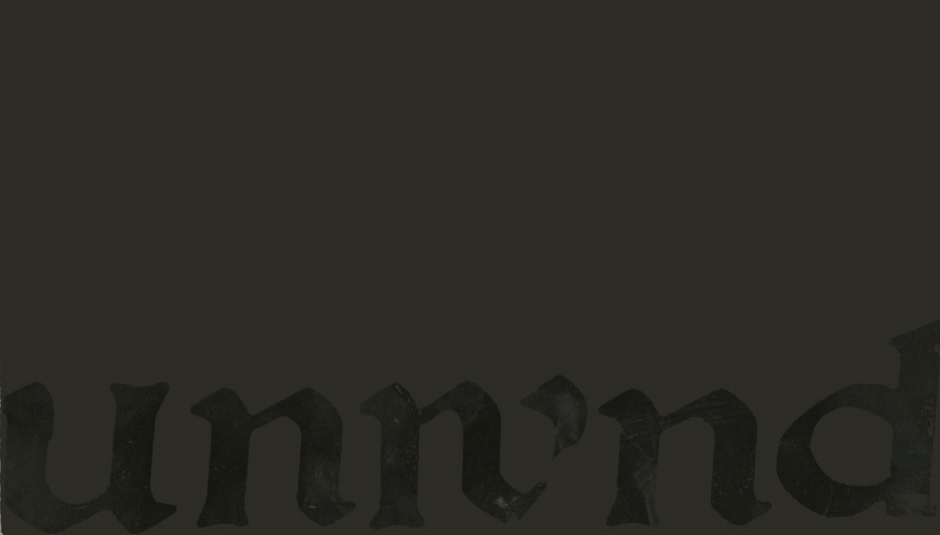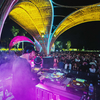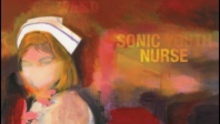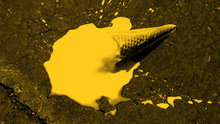In the liner notes of The Numero Group's recent re-packaged and re-mastered Empire box set (the last set of Unwound's re-issued back-catalogue), drummer Sara Lund writes about a traumatic experience that essentially broke up the band while touring what would become their final record, 2001’s Leaves Turn Inside You. The band were on tour in Boston the night before the attacks and due to be playing two showcases in New York City at CMJ on 11 and 12 September. However, despite their best efforts, these shows were cancelled due to the city being on lockdown, so they went on to their next one.
"Our next show was in Hoboken, NJ at Maxwell’s on 13 Sept. Maxwell’s is just around the corner from the river and has a clear view of the smouldering Manhattan skyline. Most of us made our way down there at some point during the evening and just sat and watched the lights of emergency vehicles race up and down and back and forth."
The Olympia, Washington trio were a long way from home and convinced, like everybody else, that the world was ending. Well, it didn't, and they actually managed to complete the rest of their East Coast tour with what they later described as "the most fun, oddly enough. We were getting better as a five-piece band, finding our groove with one another musically" with what was probably a combination of survival instincts and adrenaline keeping them going. However, by the end of their remaining dates, the band, shattered and traumatised, made their way back to the West Coast and bar a final show in their hometown (ironically on 1 April 2002), never played together again.
While Unwound had no earthly way of predicting what was coming around the corner, they are catharsis-music personified. Throughout their ascension during the 90s, the band always produced a dark, nervous energy which their songs and albums existed on and had perfected by the time of Leaves Turn Inside You. It’s an epic which sounds almost completely alien to their 90s output, but it’s still recognisably them and would prove to be their darkest and most accomplished effort yet; a fitting backdrop to the terror ahead of them.
In many ways, the band paralleled their East Coast equivalents Fugazi, a band who also only played "all-ages" shows and throughout the 90s improved their signature sound without ever compromising. Fugazi also released their greatest statement and biggest musical departure in 2001, their final album The Argument, which also taps into themes of American paranoia just before tragedy struck. In many ways, Unwound existed constantly in Fugazi's shadow as the latter were a far more popular and mainstream act, largely due to their importance to American DIY Punk and Indie music in the 80s. Meanwhile, the younger Unwound first broke through with 1993's Fake Train, a brilliant album released on the by-then legendary Kill Rock Stars label and Sara Lund's first output with the band.
Before this, Unwound were a scrappy hardcore band trying to find their sound, with the band's original drummer Brandt Sandero, a school friend of Justin Trosper (Guitar, Vocals) and Vern Rumsey (Bass), who formed the band (originally called Giant Henry) barely out of High School in 1991. While they showed promise, playing Calvin Johnson’s International Pop Underground Festival in 1991 along with Bikini Kill in their third show, it wasn't until the arrival of Lund in 1992, introduced to the band by Janet Weiss, Sleater-Kinney's drummer, that they really became a force to be reckoned with. Lund offered a creativity and control not previously available to Trosper and Rumsey, who both flourished as musicians and songwriters with Lund behind the kit.
From there on, Unwound enjoyed a healthy relationship with Kill Rock Stars, putting out three full-lengths of increasing quality between 1994 and 1996 - New Plastic Ideas, The Future of What and Repetition - and touring with their biggest influences, Sonic Youth, Fugazi and Polvo. With every record, they grew and expanded on their angular, dissonant, yet alluring post-hardcore sound. Repetition proved to be the band's 90's creative and commercial peak thanks to their only real "hit", 'Corpse Pose'. Meanwhile, the punk and alt-rock scenes were exploding, especially in their native Northwestern America, but a combination of their strange, transgressive sound and a fierce DIY ethos kept them from signing to a major, tempting though it may have been after Repetition's success.
And then something strange happened; the band slowed down for the first time in their career. After an incredibly prolific period in the mid-90s, the end of the decade and the millennium beckoned, and the band decided to spend a longer, more concerted effort in the studio and experiment with their sound. While they recorded the result, 1998's Challenge For A Civilised Society, in the same conditions as before – at John and Stu's in Seattle with long-time producer Steve Fisk – they crucially took a long break after finishing their Repetition tour. The album is instantly noticeable for it's "bigger" sound on opening track 'Data', but it also had songs that didn't fly out the traps at a breakneck speed, and utilised more studio effects in contrast to their previously fairly "natural" sound.
Challenge also saw the band use more synthesisers and Trosper's other brass instruments on 'Sonata for Loudspeakers'. Ultimately, much like Fugazi's End Hits released the same year, it remains the band's least consistent effort. However, it was also their most ambitious record to date, with the blueprints clearly being laid for what was to come. On songs like the masterfully creepy 'Lifetime Achievement Award' or 'What Went Wrong', Unwound were priming themselves for something bigger than they had ever previously imagined. After a European tour with Mogwai and a couple of John Peel sessions, the band took some time out to ready themselves for their biggest project yet: building their own studio. They took everything they had learned from spending the better part of a decade in a studio and used their earnings to build Magnetic Recording One (or MagRecOne for short) in downtown Olympia.
As Justin Trosper put it at the time: "Every record, we tried to raise the bar to some degree by asking: ‘What can we do to make this better?’ Usually, that was just increasing the amount of time we spent in the studio. So the idea with the last record is that we would build a studio to record ourselves and break out of the pattern we'd established with [longtime producer] Steve Fisk and we'd have as much time to do it as we wanted — for better or worse. And there were life changes going on with the band members too. It became a long project. It's totally different than all our other records. It's way more inner.”
The band enlisted Phil Ek (Built to Spill, Les Savy Fav, Fleet Foxes) to help carve out what would become the band's final resting place. The band took a year of relentless playing, writing, recording and re-recording holed up in their basement studio trying to create their defining statement, half-killing themselves in the process. If you needed an indicator of the mania inflicted from creating Leaves Turn Inside You, just listen to its opening track 'We Invent You' which opens on a single note of feedback so long and so dread-filled it would make Super Hans proud. The double album that follows these two minutes of atonal noise is a statement; it makes the listener sit down and pay attention in a trance, one that never lets up until the slightly humourous "rag-time" finale of 'Who Cares' 70-plus minutes later.
Leaves Turn Inside You is a stunning record right from it's opening prolonged intro. It shifts and slivers and supernaturally sits in the shadows, spotting ‘Ghosts’, shivering in ‘December’, searching for ‘Termini’, sees ‘Demons Singing Love Songs’ and the ‘Summer Freezing’ and all anchored by spooky figures like Scarlette. Over the course of its haunted expedition, it traverses, in one especially thrilling sequence, between Godspeed-esque post-apocalyptic gloom (‘Terminus’), chilling pop songs featuring Janet Weiss's haunted vocals (‘Demons Sing Love Songs’), hits the wild west in a storm of slide guitars and a cacophony of marching drums (‘Off This Century’), wakes up on Side C in a My Bloody Valentine-reminiscent fever dream (‘One Lick Less’) before finally blowing up in a bloody conclusion, returning the band to their post-hardcore roots (‘Scarlette’).
It’s staggering the album manages to keep going after this 30 minute, five-movement suite. This section alone would make an E.P for a lesser band or even an aspiring composer envious and yet there is more. Leaves may start and end slower than its earth-shattering middle-section, but it’s a deception. In 'Radio Gra' and 'Below The Salt' we get an almost entirely instrumental epilogue to the climax which shakes the listener to their core as the band reaches their metaphorical death. Unwound have always been fascinated in the morbid – just look at 'Disappoint' & 'Swan' at the conclusion of The Future Of What - but in Leaves this suspended sense of limbo is introduced from the very first note and doesn't leave until the needle finally slips off the groove.
Unwound remain a criminally underrated band, though the recent re-issues have begun to change that. Many reach for their more successful peers in Sonic Youth, Fugazi, Godspeed! and even later acts like ...And You Will Know Us By The Trail of Dead instead (Conrad Keeley studied at Evergreen College in Olympia, Washington around the same time as Unwound's peak). Unwound's music and existence has always been in a liminal zone; too young to be acknowledged alongside Nirvana, Sonic Youth & Fugazi in the early 90s, too old to be appreciated for the post-hardcore explosion of the early 00s.
This doesn't really matter now. What’s important is that Unwound's music continues to stand the test of time, even transcend it in places, as they were so far ahead of their peers' everyone else is still playing catch-up. While they may not have attained the same notable status as these other well-known acts, they cannot be denied their consistency and ambition retrospectively and the fact they finished shortly after releasing their, and arguably post-hardcore’s, best album is a testament to that.























